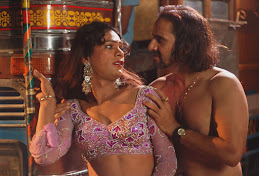
Screening of film '68 Pages' at -
Tasveer : Independent South Asian Film Festival, Seattle, USA
Saturday September 27th, 2008 2:30 PM
Anil Vora's interview with the director Sridhar Rangayan
Anil: It seems to me this is the first such artistic collaboration between a community NGO and a filmmaker in India, is it? [Which is very different than the Bill & Melinda Gates Foundation giving money to have the AIDS Jaago films made]. Can you talk more about this collaboration and the potential that it will set an example for future collaborations between NGOs of all stripes and film as a medium to impact people’s lives.
Sridhar: Making 68 Pages has been an enlightening process, not only for me as a filmmaker but also for the cast & crew. Simply because Humsafar, the organization that produced the film has been working with the LGBTQ community at the grassroots level and they brought in their real life experiences from case histories. Every character is an amalgamation of three of more case studies, so that they become representatives of the sub-segment we are talking about. Real stories touch an emotional chord naturally.
My creative job as a writer and director was to present it in an interesting and entertaining way. I used the Bollywood format with song, dance and high melodrama because the grassroots audience I’m targeting are already comfortable with the format. I had only to subvert the genre to my own end - by introducing marginalized characters and placing them as protagonists to convey subliminal messages.
Bollywood usually stretches the credibility of the characters. Here, I had no fear of it because the characters were real. This is also the reaction we’ve received at most of the screenings - that the film is real, honest and emotionally engaging.
Anil: I’m amazed to read about the difficulties you are facing in getting this film distributed widely in India.
Sridhar: There are two reasons for this.
For one, the digital exhibition boom in India, it is a complete myth. There are just about perhaps 10 digital screens in Bombay in which they again show digital versions of the same Bollywood blockbuster. Ditto with digital distribution channels like UFO, etc., which has small screens in most cities and small towns, but they still want the popcorn flicks with big star cast. The real digital films have actually no distribution possibility apart from putting it up online.
There is also a very vicious chicken and egg syndrome at play here. The satellite channels don’t pick up films that have not screened in theaters and the DVD distributors again look for films that have a star cast. So where does alternative cinema head towards – the dustbin!
The second point being of the subject matter. We were told by a distributor: ‘You have no normal characters in the film’ (which means a heterosexual romance)! My producer, Vivek, turned around and said, “As far as I’m concerned, all our characters are normal.”
Anil: I thought I also read that the film was finally releasing at a multiplex in Delhi. Is that true?
Sridhar: Since mainstream distribution seemed out of question, we looked for other options to reach the film across. We initiated a 12 city tour ‘Sang Mere’ festival (with a grant from HIVOS) to take the film across India.
We wanted to kick off the touring festival in Bombay at a mainstream venue and were in talks with several multiplexes. One of them said, ‘Who are the celebrities you are bringing?’. I told them I wanted to screen a film not hold a celebrity circus. Another multiplex who talked about corporate social responsibility didn’t even get back after they visited our website and realized it is a film on homosexuality. And the multiplex in Delhi said their social responsibility is already full up with other issues. I then realized homosexuality and AIDS is much more of a taboo with the corporate world and the educated, compared to the grassroots which is more accepting.
Anyway, going back to your earlier question, collaborating with an organization like Humsafar brings along wonderful benefits – they are connected directly to the audiences. The touring festival has been a great success in the six cities we have screened till date, because Humsafar, in association with a local NGO or government body, brought in the audiences – which included people working with the issue, stakeholders, the community itself and also the general public. The discussions after the screenings have been extremely enriching.
So there is always a way, you see, and I ‘hope’ not to lose hope!
Anil: What has been your distribution experience so far in the US with this film?
Sridhar: We certainly were not looking for theatrical release in US because it is not made for a western audience. We are targeting niche festivals and universities. The DVDs will be soon available on Amazon, which would be of great interest not only to people working with the development sector but also South Asians who want to know about the ground realities in India.
I have packaged four more short films on queer themes, made by other Indian directors, along with 68 Pages in an attempt to provide a platform and encourage short films on the subjects. Otherwise these films never get to be seen anywhere.
Anil: My personal favorites were Payal and Umrao’s stories followed by the gay couple. I thought you were particularly effective in unraveling those stories.
Sridhar: Women (even men in women clothes) always bring out the emotions very well… and perhaps that’s why I’m partial towards them. Every director has a lady muse, so what if mine are drag queens!
Link: http://isaff.tasveer.org/2008/event.php?id=41
















No comments:
Post a Comment